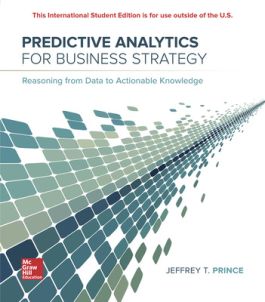Predictive Analytics for Business Strategy ISE
1st Edition
1260288897
·
9781260288896
© 2019 | Published: April 17, 2018
Designed for courses that provide a conceptual and broad-based introduction to econometrics and business analytics, Predictive Analytics for Business Strategy, 1st edition provides future managers with a basic understanding of what data can do in for…
Read More
After purchasing your eBook, login to the McGraw Hill Bookshelf website and redeem the access code from your order confirmation email.
- Access your eBook online or offline
- Easily highlight and take notes
- Fully searchable content
- Syncs across platforms
NOTE: eBook purchase does not include Connect homework or adaptive SmartBook assignments
Chapter 1: The Roles of Data and Predictive Analytics in Business
Chapter 2: Reasoning with Data
Chapter 3: Reasoning from Sample to Population
Chapter 4: The Scientific Method: The Gold Standard for Establishing Causality
Chapter 5: Linear Regression as a Fundamental Descriptive Tool
Chapter 6: Correlation vs. Causality in Regression Analysis
Chapter 7: Basic Methods for Establishing Causal Inference
Chapter 8: Advances Methods for Establishing Causal Inference
Chapter 9: Prediction for a Dichotomous Variable
Chapter 10: Identification and Data Assessment
Chapter 2: Reasoning with Data
Chapter 3: Reasoning from Sample to Population
Chapter 4: The Scientific Method: The Gold Standard for Establishing Causality
Chapter 5: Linear Regression as a Fundamental Descriptive Tool
Chapter 6: Correlation vs. Causality in Regression Analysis
Chapter 7: Basic Methods for Establishing Causal Inference
Chapter 8: Advances Methods for Establishing Causal Inference
Chapter 9: Prediction for a Dichotomous Variable
Chapter 10: Identification and Data Assessment
Designed for courses that provide a conceptual and broad-based introduction to econometrics and business analytics, Predictive Analytics for Business Strategy, 1st edition provides future managers with a basic understanding of what data can do in forming business strategy without getting into a taxonomy of models and their statistical properties. Through engaging questions, explanations, and applications, students develop a deeper understanding of the fundamental reasoning behind how and why analysis can generate actionable knowledge and learn to think critically about whether a given analysis has merit or not.

